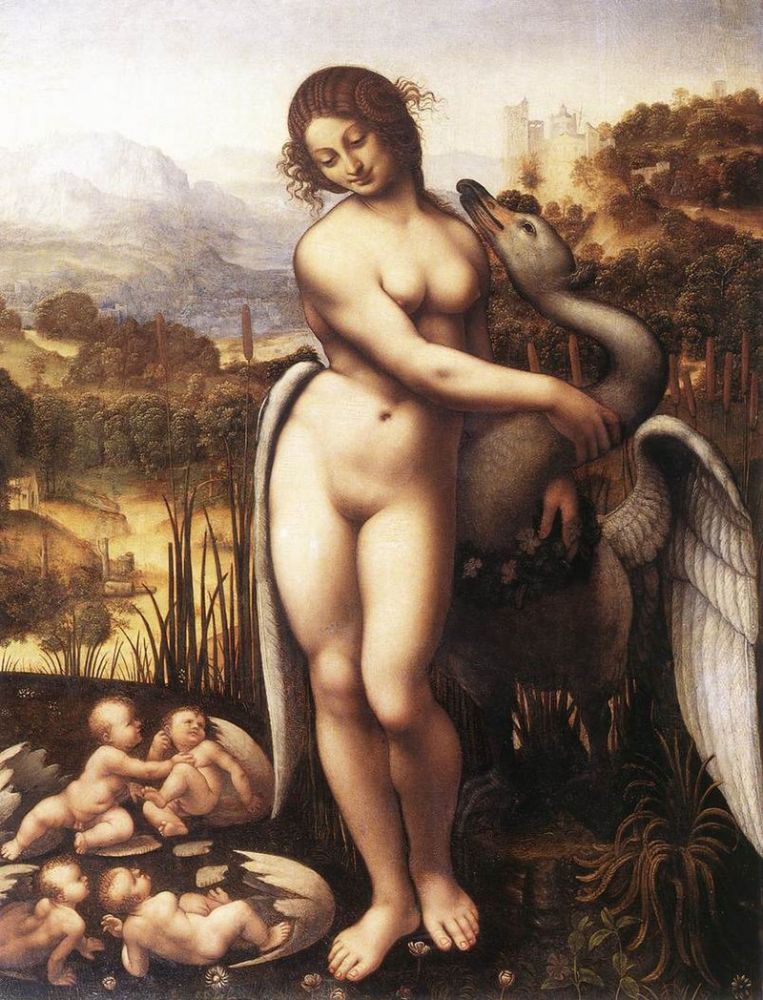(十四)剪不断理还乱
彼特拉克的《歌集》第129首:
爱引导着我,思绪万千,
翻越重山,因为每条燃烧的路
都搅乱了平静的生活。
如果孤独的坡上有小溪或喷泉,
如果两座丘陵之间有一个幽暗的山谷,
苦恼的心会在那儿平静下来:
而且,被爱情所邀,
或微笑,或哭泣,或恐惧或安逸:
我的心追随着她,脸又随心走
时而沉郁,时而明朗,
情绪阴晴不定:
所以情场老手见到我这幅模样
会说:“他被爱火燃烧着,不知所措。”
(Love leads me on, from thought to thought,
from mountain to mountain, since every path blazed
proves opposed to the tranquil life.
If there is a stream or a fountain on a solitary slope,
if a shadowed valley lies between two hills,
the distressed soul calms itself there:
and, as Love invites it to,
now smiles, or weeps, or fears, or feels secure:
and my face that follows the soul where she leads
is turbid and then clear,
and remains only a short time in one mode:
so that a man expert in such a life would say
at the sight of me: 'He is on fire, and uncertain of his state.')
我在高山上和蛮荒的树林里
找到休息处:每个有人烟的地方
是我眼中的凡俗之敌。
每走一步,脑海中就冒出一个
关于她的新念想,将我的痛苦
化成喜悦,因为她:
而且由于,我常常希望
改变这种苦甜交加的生活
我说:“也许爱在拯救你
为了更好的将来:
也许你对另一个人好,对自己却很残忍”。
我叹息着,继续说:
“这是真的吗?为何会这样?何时开始的?”
(I find some repose in high mountains
and in savage woods: each inhabited place
is the mortal enemy of my eyes.
At every step a new thought of my lady
is born, which often turns the suffering
I bear to joy, because of her:
and, as often as I wish
to alter my bitter and sweet life,
I say: 'Perhaps Love is saving you
for a better time:
perhaps you are dear to another, hateful to yourself.'
And with this, sighing, I continue:
‘Now can this be true? And how? And when?')
有时我会停留在高高的松树或山丘
的阴影下,伫立在第一块石头上
满脑子想着她那张可爱的脸。
回过神来,我发现自己的胸口
被悔恨的泪水打湿了:然后我说:“哎,
你来找谁,你与谁分开了呢!”
只要我能坚持
把散漫的思绪集中在第一个想法上,
凝视着她,忘了我自己,
我觉得爱离我如此之近
我的灵魂甚至对自己的错误感到满意:
我在很多地方见过她,她如此可爱,
我所要求的不会比上次的错误更多。
(Sometimes I stop where a high pine tree or a hill
provides shade, and on the first stone
I trace in my mind her lovely face.
When I come to myself, I find my chest
wet with pity: and then I say: 'Ah, alas,
what are you come to, and what are you parted from!'
But as long as I can keep
my wandering mind fixed on that first thought,
and gaze at her, and forget myself,
I feel Love so close to me
that my soul is satisfied with its own error:
I see her in many places and so lovely,
that I ask no more than that my error last.)
许多次我在这里见到栩栩如生的她
(现在,谁会相信我呢?)在清澈的水里
在绿草地,在山毛榉树干上,
在洁白的云朵里,形象如此多变,勒达
肯定会说她的女儿黯然失色了,
和星星一样,太阳被其光线遮挡:
我走过的地方越原始
经过的海岸越荒凉,
脑海里描绘的她就越美丽。
当真实打消了
那个甜蜜的错误,我仍然坐在那儿全身发凉,
如同一块活石上的死石,
以一个思考、哭泣和写作的男人形象出现。
Many times I have seen here vividly
(now, who will believe me?) in clear water
and on green grass, and in a beech trunk,
and in a white cloud, so made that Leda
would surely have said her daughter was eclipsed,
like a star the sun obscures with its rays:
and the wilder the place I find
and the more deserted the shore,
the more beautifully my thoughts depict her.
Then when the truth dispels
that sweet error, I still sit there chilled,
the same, a dead stone on living stone,
in the shape of a man who thinks and weeps and writes.
我感到一种强烈的渴望将我引到
最高和最有用的山峰
其他山脉的阴影无法落到这里:
我在那儿开始用眼睛衡量
我的痛苦,哭泣着,释放
凝结在心中的愁云
当我思考着并看到
我与她可爱的脸之间的距离,
总是那么近,又那么遥远
然后我轻声哭泣:
“哎,你知道什么!也许在某个地方
她正在为你的缺席而叹气”。
这个想法让灵魂释怀。
(I feel a sole intense desire draw me
where the shadow of no other mountain falls,
towards the highest and most helpful peak:
from there I begin to measure out my suffering
with my eyes, and, weeping, to release
the sorrowful cloud that condenses in my heart,
when I think and see,
what distance parts me from her lovely face,
which is always so near to me, and so far.
Then softly I weep to myself:
'Alas, what do you know! Perhaps somewhere
now she is sighing for your absence.'
And the soul takes breath at this thought.)
歌,在山上飘扬
那里的天空更加宁静和快乐,
你会在奔腾的溪流旁再次看到我,
那里有芬芳的月桂树
连微风都带着香。
那儿有我的心,那颗被她偷走的心:
在这里你只能看到我的幽灵。
(Song, beyond the mountain,
there where the sky is more serene and joyful,
you will see me once more by a running stream,
where the breeze is fragrant
with fresh and perfumed laurel.
There is my heart, and she who steals it from me:
here you can only see my ghost. )

诗歌中的月桂象征着纯洁。彼特拉克引用了希腊神话中勒达的故事,承认他的百转千回的思念中夹杂着很多性幻想。勒达是斯巴达王之妻,宙斯变身天鹅与勒达调情。勒达生下两枚鹅蛋,一个鹅蛋裂开,里面出来海伦的哥哥卡斯托耳与波吕丢刻斯,另一个鹅蛋裂开,出来海伦和克吕泰涅斯特拉。意大利庞贝古城挖掘出来的壁画里就有“勒达与天鹅”(Leda and the Swan)题材,表达出人类对性爱的渴望与追求。彼特拉克见到劳拉“在清澈的水里,在绿草地,在山毛榉树干上,在洁白的云朵里,形象如此多变”,连勒达都大为惊叹,他于此含蓄地表示了自己对有着一头金发的劳拉的肉体的渴望。1348年劳拉离世时,诗人痛苦万分。后来,在《给后人的信》中,诗人写道:“我年轻时,我曾一直和那无法抵抗的,但是纯洁的,我唯一的爱,斗争。如果不是她的早逝,我会继续斗争下去,(斗争)痛苦,但是对我有益的。斗争把那团火熄灭。我常常希望我能说我完全自由于肉体的欲望了,但是我知道,那样我是在说谎。”
(达芬奇的《勒达与天鹅》)

作者谦虚地认为收集在《歌集》中的爱情诗是他一生捋不清的混乱思想与情感的写照,所以称其为“支离破碎的俗语诗”。可世间最刻骨铭心的相思,不都是“剪不断理还乱”的吗?




